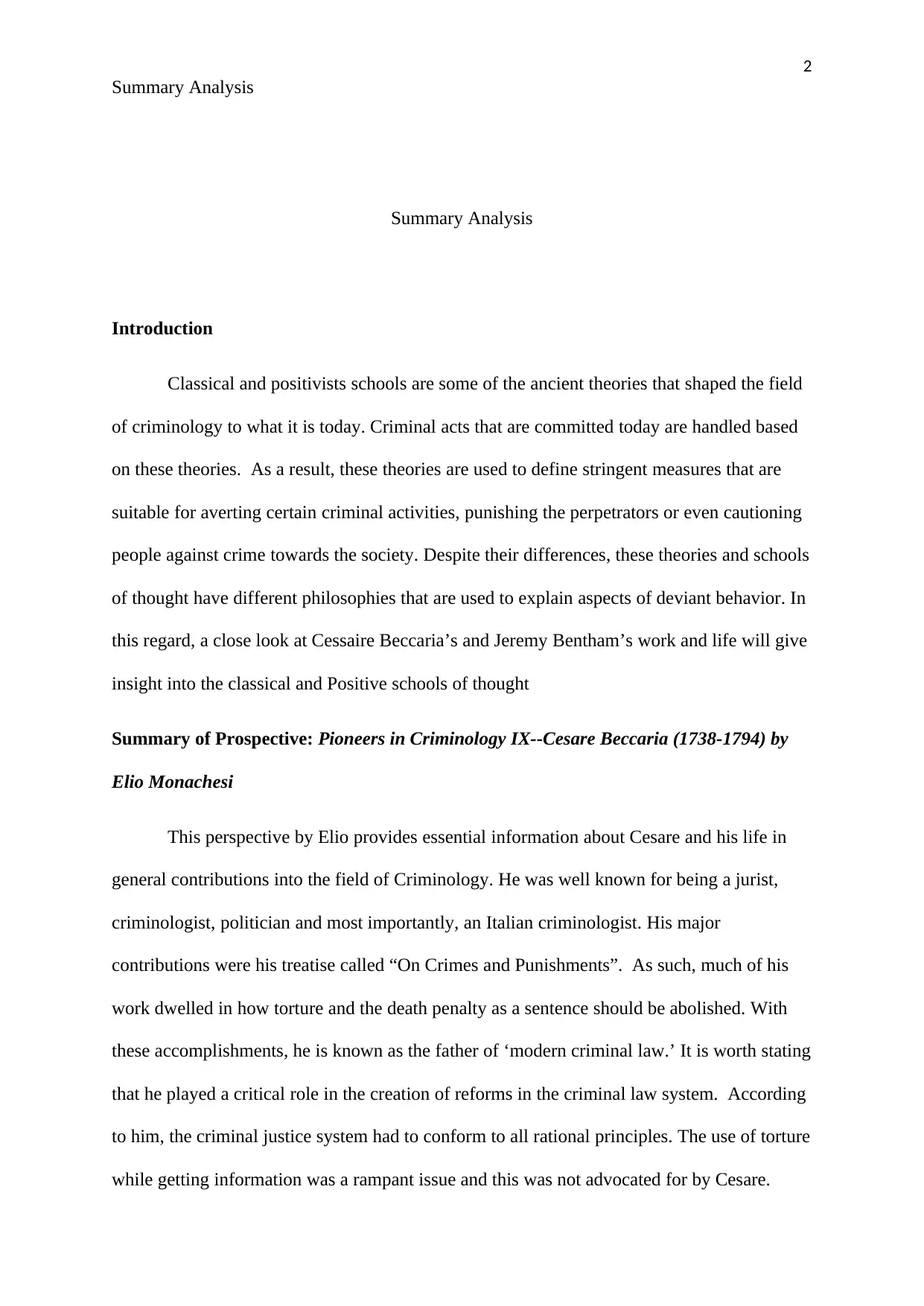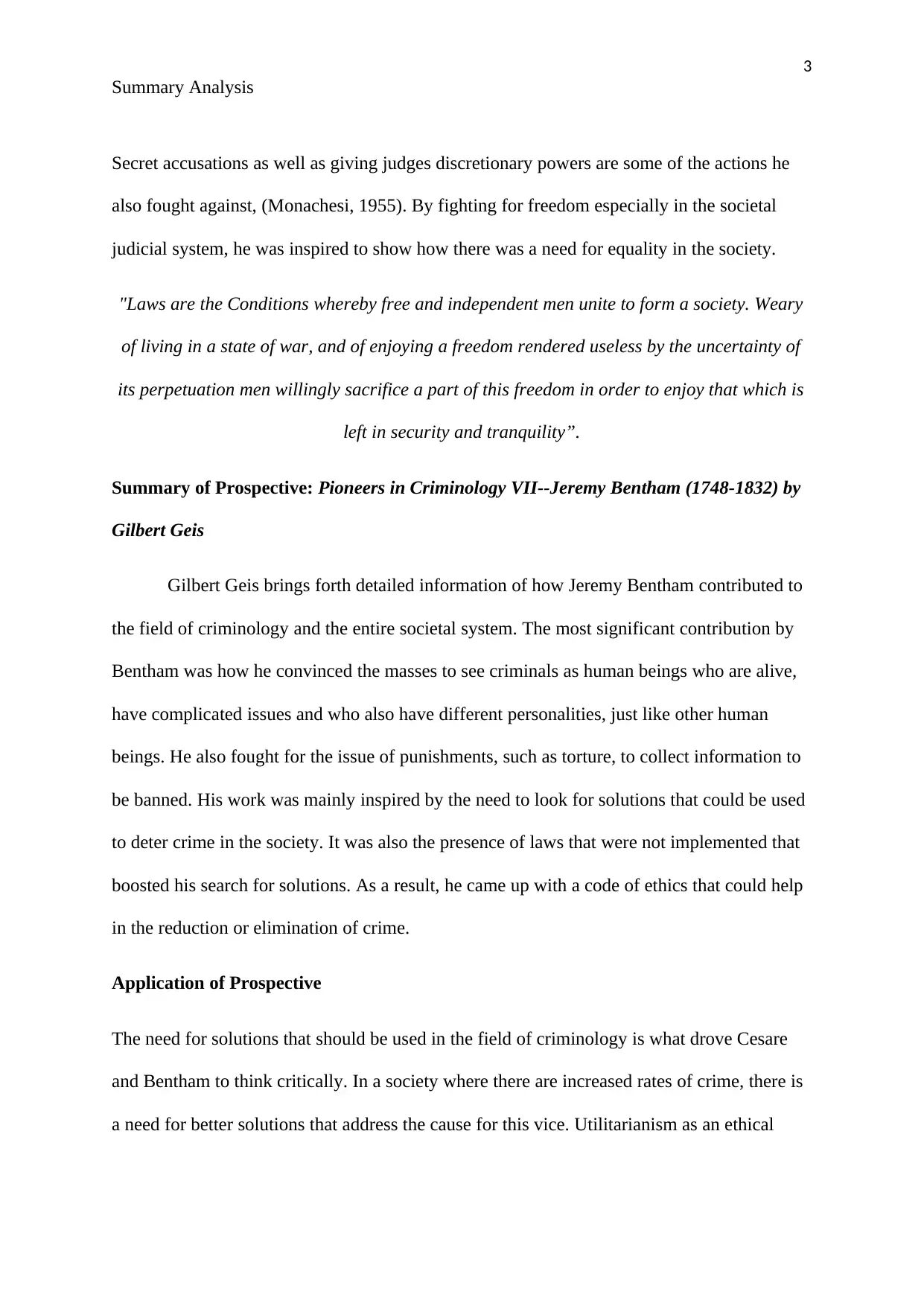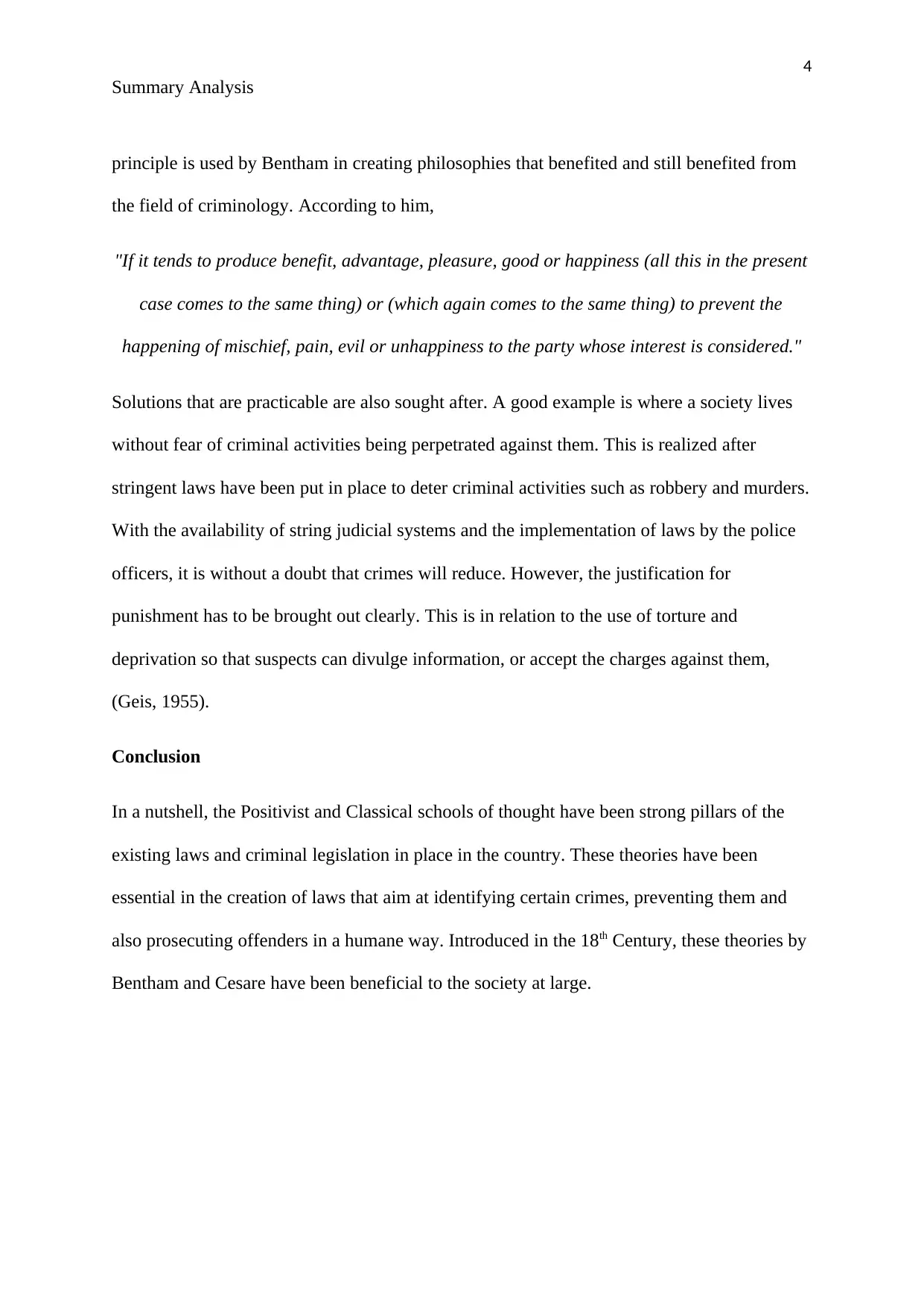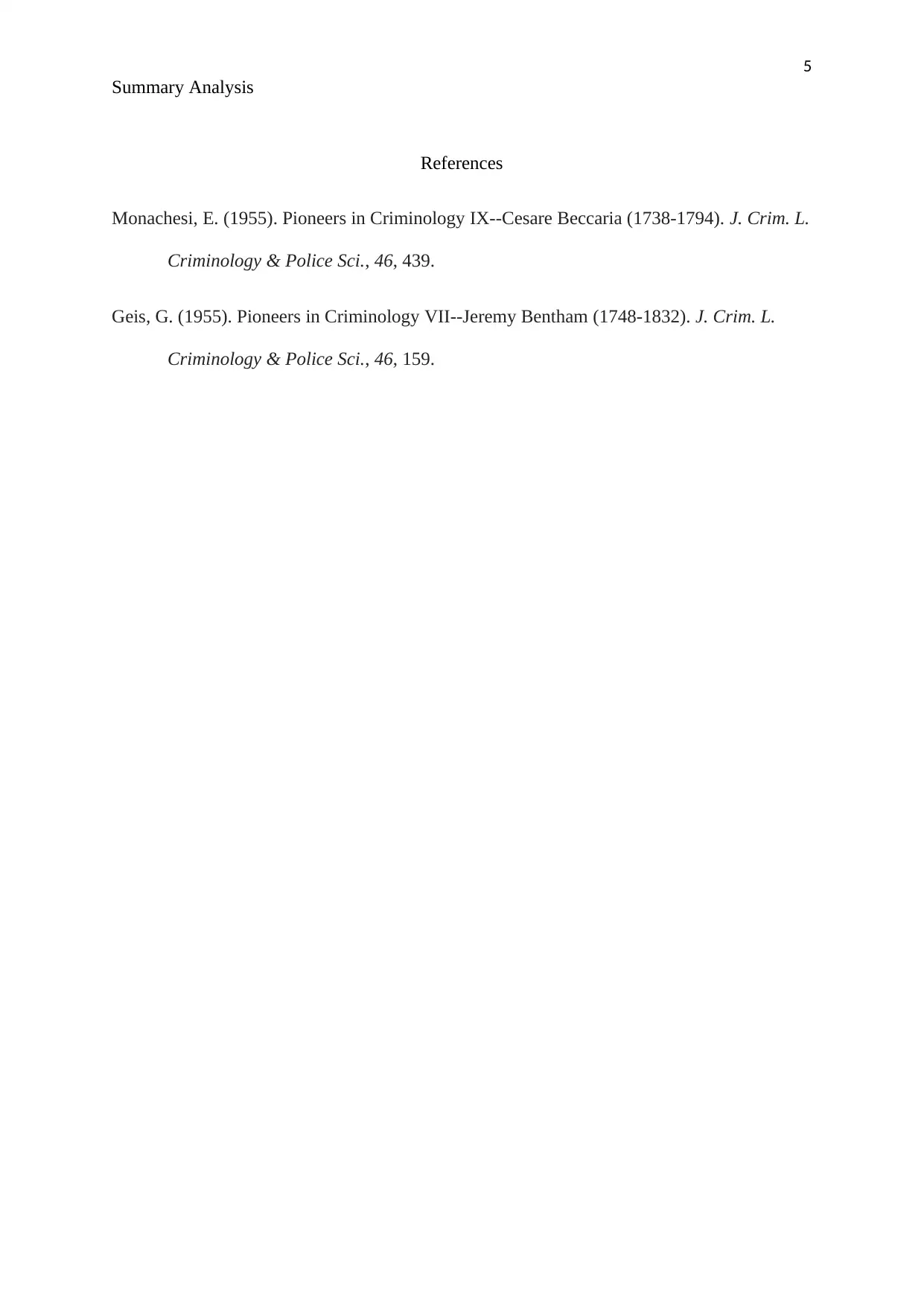Summary Analysis: Beccaria and Bentham's Influence on Criminology
VerifiedAdded on 2023/06/09
|5
|987
|79
Essay
AI Summary
This essay provides a summary analysis of classical and positivist schools of criminology, exploring the contributions of Cesare Beccaria and Jeremy Bentham. It highlights their impact on modern criminal law and the evolution of criminal justice, including their views on torture, the death penalty, and the need for rational principles in the legal system. The essay discusses Bentham's utilitarian approach and how it influenced the understanding of criminals as human beings, as well as the importance of ethical codes in crime reduction. It emphasizes the significance of these theories in shaping current laws, preventing crime, and ensuring humane treatment of offenders. The essay references key works by Monachesi and Geis to support its analysis, offering insights into the historical context and practical applications of these influential criminological perspectives.

Running Head: SUMMARY ANALYSIS
Summary Analysis
Name
Affiliation
Instructor
Date
Summary Analysis
Name
Affiliation
Instructor
Date
Paraphrase This Document
Need a fresh take? Get an instant paraphrase of this document with our AI Paraphraser

2
Summary Analysis
Summary Analysis
Introduction
Classical and positivists schools are some of the ancient theories that shaped the field
of criminology to what it is today. Criminal acts that are committed today are handled based
on these theories. As a result, these theories are used to define stringent measures that are
suitable for averting certain criminal activities, punishing the perpetrators or even cautioning
people against crime towards the society. Despite their differences, these theories and schools
of thought have different philosophies that are used to explain aspects of deviant behavior. In
this regard, a close look at Cessaire Beccaria’s and Jeremy Bentham’s work and life will give
insight into the classical and Positive schools of thought
Summary of Prospective: Pioneers in Criminology IX--Cesare Beccaria (1738-1794) by
Elio Monachesi
This perspective by Elio provides essential information about Cesare and his life in
general contributions into the field of Criminology. He was well known for being a jurist,
criminologist, politician and most importantly, an Italian criminologist. His major
contributions were his treatise called “On Crimes and Punishments”. As such, much of his
work dwelled in how torture and the death penalty as a sentence should be abolished. With
these accomplishments, he is known as the father of ‘modern criminal law.’ It is worth stating
that he played a critical role in the creation of reforms in the criminal law system. According
to him, the criminal justice system had to conform to all rational principles. The use of torture
while getting information was a rampant issue and this was not advocated for by Cesare.
Summary Analysis
Summary Analysis
Introduction
Classical and positivists schools are some of the ancient theories that shaped the field
of criminology to what it is today. Criminal acts that are committed today are handled based
on these theories. As a result, these theories are used to define stringent measures that are
suitable for averting certain criminal activities, punishing the perpetrators or even cautioning
people against crime towards the society. Despite their differences, these theories and schools
of thought have different philosophies that are used to explain aspects of deviant behavior. In
this regard, a close look at Cessaire Beccaria’s and Jeremy Bentham’s work and life will give
insight into the classical and Positive schools of thought
Summary of Prospective: Pioneers in Criminology IX--Cesare Beccaria (1738-1794) by
Elio Monachesi
This perspective by Elio provides essential information about Cesare and his life in
general contributions into the field of Criminology. He was well known for being a jurist,
criminologist, politician and most importantly, an Italian criminologist. His major
contributions were his treatise called “On Crimes and Punishments”. As such, much of his
work dwelled in how torture and the death penalty as a sentence should be abolished. With
these accomplishments, he is known as the father of ‘modern criminal law.’ It is worth stating
that he played a critical role in the creation of reforms in the criminal law system. According
to him, the criminal justice system had to conform to all rational principles. The use of torture
while getting information was a rampant issue and this was not advocated for by Cesare.

3
Summary Analysis
Secret accusations as well as giving judges discretionary powers are some of the actions he
also fought against, (Monachesi, 1955). By fighting for freedom especially in the societal
judicial system, he was inspired to show how there was a need for equality in the society.
"Laws are the Conditions whereby free and independent men unite to form a society. Weary
of living in a state of war, and of enjoying a freedom rendered useless by the uncertainty of
its perpetuation men willingly sacrifice a part of this freedom in order to enjoy that which is
left in security and tranquility”.
Summary of Prospective: Pioneers in Criminology VII--Jeremy Bentham (1748-1832) by
Gilbert Geis
Gilbert Geis brings forth detailed information of how Jeremy Bentham contributed to
the field of criminology and the entire societal system. The most significant contribution by
Bentham was how he convinced the masses to see criminals as human beings who are alive,
have complicated issues and who also have different personalities, just like other human
beings. He also fought for the issue of punishments, such as torture, to collect information to
be banned. His work was mainly inspired by the need to look for solutions that could be used
to deter crime in the society. It was also the presence of laws that were not implemented that
boosted his search for solutions. As a result, he came up with a code of ethics that could help
in the reduction or elimination of crime.
Application of Prospective
The need for solutions that should be used in the field of criminology is what drove Cesare
and Bentham to think critically. In a society where there are increased rates of crime, there is
a need for better solutions that address the cause for this vice. Utilitarianism as an ethical
Summary Analysis
Secret accusations as well as giving judges discretionary powers are some of the actions he
also fought against, (Monachesi, 1955). By fighting for freedom especially in the societal
judicial system, he was inspired to show how there was a need for equality in the society.
"Laws are the Conditions whereby free and independent men unite to form a society. Weary
of living in a state of war, and of enjoying a freedom rendered useless by the uncertainty of
its perpetuation men willingly sacrifice a part of this freedom in order to enjoy that which is
left in security and tranquility”.
Summary of Prospective: Pioneers in Criminology VII--Jeremy Bentham (1748-1832) by
Gilbert Geis
Gilbert Geis brings forth detailed information of how Jeremy Bentham contributed to
the field of criminology and the entire societal system. The most significant contribution by
Bentham was how he convinced the masses to see criminals as human beings who are alive,
have complicated issues and who also have different personalities, just like other human
beings. He also fought for the issue of punishments, such as torture, to collect information to
be banned. His work was mainly inspired by the need to look for solutions that could be used
to deter crime in the society. It was also the presence of laws that were not implemented that
boosted his search for solutions. As a result, he came up with a code of ethics that could help
in the reduction or elimination of crime.
Application of Prospective
The need for solutions that should be used in the field of criminology is what drove Cesare
and Bentham to think critically. In a society where there are increased rates of crime, there is
a need for better solutions that address the cause for this vice. Utilitarianism as an ethical
⊘ This is a preview!⊘
Do you want full access?
Subscribe today to unlock all pages.

Trusted by 1+ million students worldwide

4
Summary Analysis
principle is used by Bentham in creating philosophies that benefited and still benefited from
the field of criminology. According to him,
"If it tends to produce benefit, advantage, pleasure, good or happiness (all this in the present
case comes to the same thing) or (which again comes to the same thing) to prevent the
happening of mischief, pain, evil or unhappiness to the party whose interest is considered."
Solutions that are practicable are also sought after. A good example is where a society lives
without fear of criminal activities being perpetrated against them. This is realized after
stringent laws have been put in place to deter criminal activities such as robbery and murders.
With the availability of string judicial systems and the implementation of laws by the police
officers, it is without a doubt that crimes will reduce. However, the justification for
punishment has to be brought out clearly. This is in relation to the use of torture and
deprivation so that suspects can divulge information, or accept the charges against them,
(Geis, 1955).
Conclusion
In a nutshell, the Positivist and Classical schools of thought have been strong pillars of the
existing laws and criminal legislation in place in the country. These theories have been
essential in the creation of laws that aim at identifying certain crimes, preventing them and
also prosecuting offenders in a humane way. Introduced in the 18th Century, these theories by
Bentham and Cesare have been beneficial to the society at large.
Summary Analysis
principle is used by Bentham in creating philosophies that benefited and still benefited from
the field of criminology. According to him,
"If it tends to produce benefit, advantage, pleasure, good or happiness (all this in the present
case comes to the same thing) or (which again comes to the same thing) to prevent the
happening of mischief, pain, evil or unhappiness to the party whose interest is considered."
Solutions that are practicable are also sought after. A good example is where a society lives
without fear of criminal activities being perpetrated against them. This is realized after
stringent laws have been put in place to deter criminal activities such as robbery and murders.
With the availability of string judicial systems and the implementation of laws by the police
officers, it is without a doubt that crimes will reduce. However, the justification for
punishment has to be brought out clearly. This is in relation to the use of torture and
deprivation so that suspects can divulge information, or accept the charges against them,
(Geis, 1955).
Conclusion
In a nutshell, the Positivist and Classical schools of thought have been strong pillars of the
existing laws and criminal legislation in place in the country. These theories have been
essential in the creation of laws that aim at identifying certain crimes, preventing them and
also prosecuting offenders in a humane way. Introduced in the 18th Century, these theories by
Bentham and Cesare have been beneficial to the society at large.
Paraphrase This Document
Need a fresh take? Get an instant paraphrase of this document with our AI Paraphraser

5
Summary Analysis
References
Monachesi, E. (1955). Pioneers in Criminology IX--Cesare Beccaria (1738-1794). J. Crim. L.
Criminology & Police Sci., 46, 439.
Geis, G. (1955). Pioneers in Criminology VII--Jeremy Bentham (1748-1832). J. Crim. L.
Criminology & Police Sci., 46, 159.
Summary Analysis
References
Monachesi, E. (1955). Pioneers in Criminology IX--Cesare Beccaria (1738-1794). J. Crim. L.
Criminology & Police Sci., 46, 439.
Geis, G. (1955). Pioneers in Criminology VII--Jeremy Bentham (1748-1832). J. Crim. L.
Criminology & Police Sci., 46, 159.
1 out of 5
Related Documents
Your All-in-One AI-Powered Toolkit for Academic Success.
+13062052269
info@desklib.com
Available 24*7 on WhatsApp / Email
![[object Object]](/_next/static/media/star-bottom.7253800d.svg)
Unlock your academic potential
Copyright © 2020–2026 A2Z Services. All Rights Reserved. Developed and managed by ZUCOL.




